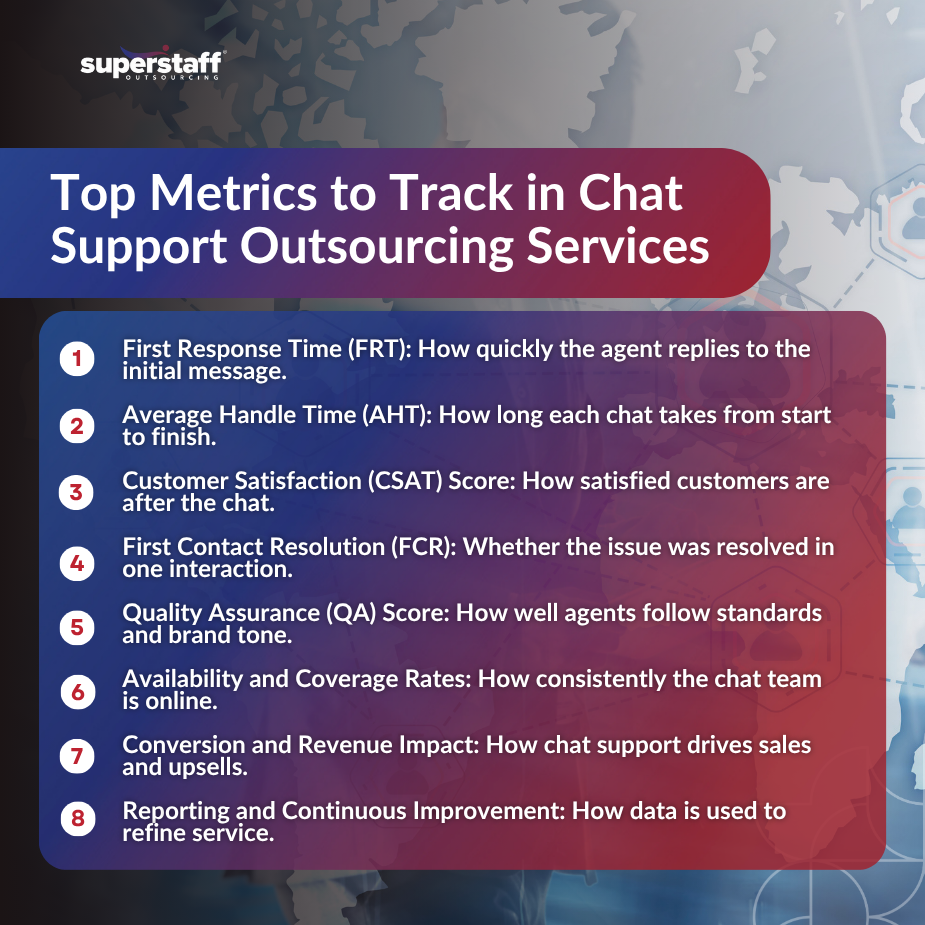
In today’s fast-paced digital economy, more businesses are doubling down on live chat to meet customers where they are—online and in real time. But if you’re investing in chat support outsourcing services, how do you know your outsourced team is actually delivering?
Live chat has quickly evolved into one of the most valuable customer touchpoints, especially in industries like e-commerce, technology, and professional services. It’s not just a convenience anymore—it’s an expectation. Customers demand quick answers, personalized support, and consistent service across every interaction. That puts pressure on companies to ensure that their outsourced chat teams aren’t just online, but on point.
But here’s the thing: measuring success in chat support outsourcing services isn’t only about how fast agents respond. It’s about how well they resolve issues, how satisfied customers feel after the interaction, and how those experiences translate to loyalty, retention, and even revenue.
Breaking Down the Top Customer Service Metrics for Outsourced Chat Teams
In this blog, we’ll break down the most important customer service performance metrics you should be tracking when working with an outsourced chat support provider. From first response time to customer satisfaction scores and everything in between, this guide will help you evaluate performance with clarity—and confidence.
First Response Time (FRT)
The faster you respond, the higher your chances of delighting the customer.
First impressions matter, and in chat support, the First Response Time (FRT) is often the very first signal of your service quality. Customers expect near-instant replies—and delays can result in abandoned conversations, lost sales, and diminished trust.
Industry Benchmark Expectations for FRT
Across industries, a good FRT is typically under 60 seconds. In high-volume industries like e-commerce or SaaS, even faster responses—under 30 seconds—are expected. Anything longer, and your customer may already be checking out your competitor’s website.
The Role of Automation in Enhancing Speed
Chatbots and AI-powered auto-responses help reduce perceived wait times. They instantly greet users, collect basic details, and route them to the appropriate agent. In chat support outsourcing services, these tools are often built into service workflows to handle spikes in volume without degrading FRT.
Why Fast Isn’t Always Better Without Context
However, speed without substance is useless. A quick reply that feels robotic or fails to address the issue can frustrate customers even more. FRT must be balanced with quality—fast answers and helpful ones.
But a fast reply means little without resolution—enter the next critical metric.
Average Handle Time (AHT)
Efficiency matters, but so does thoroughness.
Average Handle Time (AHT) is the total time an agent spends handling a customer’s issue—from the first message to the final resolution—divided by the total number of chats.
Ideal Benchmarks by Industry
In general, an ideal AHT ranges from 4 to 8 minutes, but this varies. Tech support may take longer due to complexity, while retail inquiries about orders or returns should wrap up more quickly.
Balancing Speed with Meaningful Resolution
While businesses may be tempted to push for shorter AHT to improve efficiency, that often backfires. Rushing through chats can lead to unresolved issues, repeat contacts, and lower CSAT. Great chat support outsourcing services know that agents need the autonomy to take the right amount of time—not just the fastest.
How AHT Impacts Cost-Efficiency in Outsourcing Contracts
AHT directly affects staffing requirements. If average handle times are too long, it can mean more agents are needed to meet volume demands. Outsourcing partners often use AHT to forecast staffing needs and optimize scheduling.
While timing matters, the customer’s sentiment is what truly lingers.

Customer Satisfaction (CSAT) Score
CSAT is one of the clearest indicators of how customers perceive your brand.
Customer Satisfaction (CSAT) is a survey-based score collected immediately after a chat interaction. It typically asks, “How satisfied were you with your experience?” and uses a scale of 1 to 5.
How CSAT Is Collected in Chat Support
Top-tier chat support outsourcing services integrate automated CSAT surveys that pop up post-chat or are delivered via follow-up messages. These surveys often gather both quantitative ratings and qualitative feedback.
Why Response Quality and Empathy Impact CSAT
Customers don’t just judge whether their issue was resolved—they assess tone, professionalism, and the human side of the experience. A friendly, empathetic chat agent can significantly boost CSAT, even if the issue wasn’t fully resolved on the spot.
Tips to Improve CSAT with Outsourced Agents
- Include cultural and tone training during onboarding.
- Use CSAT feedback for coaching and QA evaluations.
- Recognize high performers to boost morale and consistency.
Now let’s explore how often your team actually solves problems.
First Contact Resolution (FCR)
Resolving issues in a single chat prevents churn and boosts trust.
First Contact Resolution (FCR) tracks how often a customer’s issue is fully resolved in their first interaction—without being transferred or needing to follow up later.
Why FCR Matters for Brand Loyalty
Customers don’t want to repeat themselves or contact you multiple times for the same issue. High FCR rates are linked to improved loyalty, reduced operational costs, and better customer experience.
Challenges with Measuring FCR in Outsourced Settings
Some chat support outsourcing services struggle with FCR accuracy due to unclear definitions or poor tracking systems. A strong BPO partner ensures clear definitions (e.g., resolution confirmed in chat) and reliable documentation.
How Documentation and Training Improve FCR
Documenting common issues and solutions allows agents to resolve recurring problems faster. Investing in continuous training—especially in product knowledge—also boosts FCR rates over time.
Beyond individual chats, you also need to track broader quality assurance metrics.
Quality Assurance (QA) Score
QA scores keep service aligned with your brand’s tone, goals, and policies.
QA involves reviewing chat transcripts to ensure agents follow proper protocols, demonstrate empathy, and offer accurate information.
What Goes Into QA Scoring Rubrics
QA rubrics may include:
- Grammar and professionalism
- Brand voice and tone
- Policy adherence
- Accuracy of resolution
- Soft skills like empathy and clarity
How Outsourcing Partners Standardize Evaluations
Reliable chat support outsourcing services have dedicated QA teams that audit conversations weekly. They use scorecards, calibrate results with client expectations, and identify patterns for coaching.
Frequency and Methods of QA Reporting
QA results should be shared in real time or through weekly/monthly dashboards. SuperStaff, for example, includes customized QA feedback loops in client reports to ensure alignment.
Of course, internal performance means little if your chat team isn’t consistently available.
Chat Availability and Coverage Rates
Availability metrics measure how reliably your outsourced team covers support windows.
You can’t resolve issues or make sales if your chat team isn’t online when customers are. Availability and coverage metrics assess uptime and responsiveness across time zones.
Measuring Uptime, Chat Routing, and Missed Chats
These metrics include:
- % of time chat is staffed
- Volume of missed chats or drop-offs
- Routing efficiency between agents
How 24/7 Support Boosts Conversions
When customers can get help at any time—especially during late-night shopping or urgent tech issues—they’re more likely to complete a transaction. Studies show that 24/7 chat increases conversions by up to 40%.
Role of SuperStaff in Managing Coverage Across Time Zones
SuperStaff’s global delivery model ensures full-day coverage, routing customer queries across shifts in the Philippines and Colombia to maintain service continuity without overburdening teams.
And all these metrics ultimately impact the bottom line.
Conversion and Revenue Impact
Chat support isn’t just for solving problems—it can drive real revenue.
Many businesses overlook this: your chat team can be a sales engine. From answering pre-purchase questions to upselling add-ons, chat agents influence buying behavior.
Tracking Chat-Assisted Conversions
Chat platforms now offer robust analytics that link chat sessions to completed purchases. You can track when an agent’s interaction contributed to checkout, subscription, or upgrades.
Correlation Between Chat Availability and Sales
Higher availability = higher engagement = higher conversions. Simply being present to answer a quick product question or resolve a last-minute issue can make or break a sale.
Wrapping all these metrics together creates a clear performance picture.
Reporting and Continuous Improvement
Outsourced chat support should include transparent reporting and agile improvement cycles.
Data is only valuable if you use it. That’s why reporting and iterative coaching are non-negotiable in effective chat support outsourcing services.
Importance of Weekly/Monthly Reporting
Weekly reports offer a short-term pulse check, while monthly reviews provide trend insights. These include snapshots of all key metrics: FRT, AHT, CSAT, FCR, QA, and conversion rates.
Using Metrics for Coaching and Training
Rather than using data to penalize, top providers use it to train. QA scores, CSAT feedback, and chat transcripts all inform personalized coaching that builds long-term agent performance.
Collaborative KPI Reviews With Clients
SuperStaff, for example, holds regular performance reviews with clients to fine-tune success metrics and ensure the chat team evolves with the client’s goals.
Let’s recap the essential metrics that make outsourcing chat support effective.
Improve Your Brand’s CX Metrics Through SuperStaff’s Chat Support Outsourcing Services
The success of outsourced chat support lies in consistent measurement, not just friendly conversations.
When you partner with chat support outsourcing services, you’re trusting them with your customers’ real-time experience. That’s why measuring the right metrics—First Response Time, Average Handle Time, CSAT, FCR, QA, availability, and revenue impact—is crucial to getting results that actually move your business forward.
If you’re ready to scale your customer engagement with data-backed results, SuperStaff can help you build a high-performance chat support team tailored to your goals.
Ready to outsource to the Philippines? Let’s connect and turn every chat into an opportunity.






